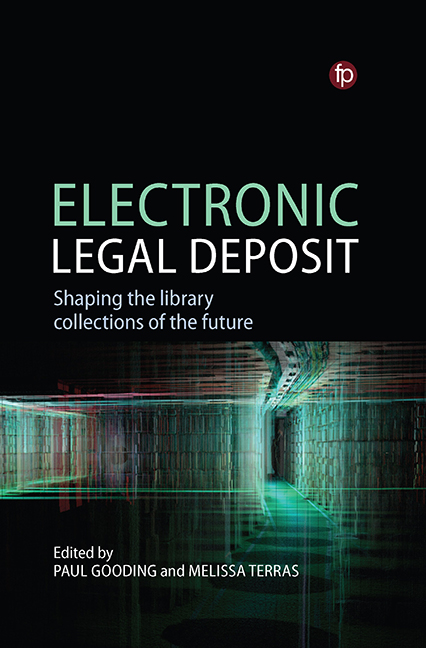Book contents
- Frontmatter
- Dedication
- Contents
- Figures and Tables
- Contributors
- Foreword
- Introduction
- PART 1 INSTITUTIONS AND IMPLEMENTATION
- 1 UK Non-Print Legal Deposit: From Regulations to Review
- 2 The Influence of Legal Deposit Legislation on the Digital Collections of the National Library Of Scotland
- 3 E-legal Deposit at the Biblioteca Nacional de México (National Library of Mexico)
- 4 Bibliographic Control in Zimbabwe: the Conundrum of Legal Deposit in the age of Digital Technologies
- 5 Electronic Legal Deposit in Sweden: the Evolution of Digital Publications and Legislative Systems
- PART 2 USERS AND CONTEXTS
- 6 Publishers, Legal Deposit and the Changing Publishing Environment
- 7 Making History: Digital Preservation and Electronic Legal Deposit in the Second Quarter of the 21st Century
- 8 Giving with one Click, Taking with the Other: Electronic Legal Deposit, Web Archives and Researcher Access
- 9 Follow the Users: Assessing UK non-print Legal Deposit within the Academic Discovery Environment
- 10 ‘An Ark to Save Learning from Deluge’? Reconceptualising Legal Deposit After the Digital Turn
- Index
10 - ‘An Ark to Save Learning from Deluge’? Reconceptualising Legal Deposit After the Digital Turn
Published online by Cambridge University Press: 07 November 2020
- Frontmatter
- Dedication
- Contents
- Figures and Tables
- Contributors
- Foreword
- Introduction
- PART 1 INSTITUTIONS AND IMPLEMENTATION
- 1 UK Non-Print Legal Deposit: From Regulations to Review
- 2 The Influence of Legal Deposit Legislation on the Digital Collections of the National Library Of Scotland
- 3 E-legal Deposit at the Biblioteca Nacional de México (National Library of Mexico)
- 4 Bibliographic Control in Zimbabwe: the Conundrum of Legal Deposit in the age of Digital Technologies
- 5 Electronic Legal Deposit in Sweden: the Evolution of Digital Publications and Legislative Systems
- PART 2 USERS AND CONTEXTS
- 6 Publishers, Legal Deposit and the Changing Publishing Environment
- 7 Making History: Digital Preservation and Electronic Legal Deposit in the Second Quarter of the 21st Century
- 8 Giving with one Click, Taking with the Other: Electronic Legal Deposit, Web Archives and Researcher Access
- 9 Follow the Users: Assessing UK non-print Legal Deposit within the Academic Discovery Environment
- 10 ‘An Ark to Save Learning from Deluge’? Reconceptualising Legal Deposit After the Digital Turn
- Index
Summary
Introduction
Despite the introduction of non-print legal deposit (NPLD), the concept of legal deposit is still viewed primarily as a function of print modes of publishing and consumption. This chapter will argue that the print era notions that influence the NPLD access and reuse regulations are increasingly out of step with broader developments in publishing, information technology and broader socio-political trends in access to information. We will explore case studies relating to archives of web materials, in order to demonstrate the ways that innovative research, publishing, and copyright are changing our understanding of what constitutes an archive. The digital archive is a space where innovation is occurring, and where the role of the library is evolving, yet NPLD regulations largely close down options for innovative approaches to digital materials.
This Frankie will use two case studies which encounter digital materials as a new media form, with their own functions and affordances. First, we will look at the Internet Archive (IA), a non-profit organisation that provides a suite of services to support national library and public-facing web archives. We will discuss how the IA's approach to copyright, and its openness to datadriven methods, allow it to provide web archival services that go far beyond those allowed under legal deposit. Second, we will review Common Crawl, another non-profit organisation that provides web archival content for noncommercial text and data mining. Through these case studies, we will demonstrate that web archives can provide a space for computational research. Innovation with digital materials is occurring within national library labs in particular, and we will conclude by applying the lessons learned from web archives to understand the challenges of innovative reuse of the NPLD e-book and e-journal collections. Similar change is occurring in relation to scholarly publishing, and yet digital scholarship is similarly closed off in each subset of NPLD collections. For scholarly publishing and use, NPLD's remediation of print services leaves it out of step with changing approaches to digital materiality elsewhere. The significance of this chapter is twofold: first, it advocates a new understanding of access to legal deposit in relation to the textuality of digital media, which we label the ‘datafication’ of the legal deposit library; and second, it recognises that unlike print media, where legal deposit materials were often not the only copy available, many non-print collections will be unique to the legal deposit libraries.
- Type
- Chapter
- Information
- Electronic Legal DepositShaping the Library Collections of the Future, pp. 203 - 228Publisher: FacetPrint publication year: 2019



